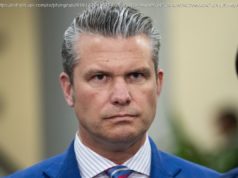Almost a year ago, Lebanon’s Prime Minister Saad Hariri was apparently summoned to Saudi Arabia and reportedly slapped around before delivering a bizarre resignation speech — later rescinded. Saudi Crown Prince Mohammed bin Salman was widely presumed to be the mastermind behind the episode. So it was a surprise last week to see Hariri share the stage at a conference in the Saudi capital with Prince Mohammed.
ISTANBUL (Tribune News Service) — It was a little less than a year ago that Lebanon’s prime minister, Saad Hariri, was apparently summoned to Saudi Arabia and reportedly slapped around before delivering a bizarre resignation speech — later rescinded.
Saudi Crown Prince Mohammed bin Salman was widely presumed to be the mastermind behind the episode, which many Lebanese characterized as a kidnapping.
So it was a surprise last week to see Hariri share the stage at an investor conference in the Saudi capital with Prince Mohammed, who was delivering his first public remarks since the killing of Saudi journalist Jamal Khashoggi.
It was even more of a surprise when the crown prince brought up the incident with Hariri.
“I just want to say Prime Minister Saad is spending two days in Saudi Arabia, so I hope there won’t be any rumors that he’s kidnapped,” the prince said.
“I’m totally free!” Hariri responded.
That expression of fealty captured what Saudi Arabia’s allies must now confront in dealing with a leader not known for tolerating dissent. Mohammed is presumed to be keeping tabs on those who have stuck by him even as Khashoggi’s death continues to elicit global condemnation.
Middle Eastern governments have had to balance how to remain in Riyadh’s good graces while Turkish officials alleged the cruel killing and dismemberment of a onetime insider turned critic.
That task was complicated by Saudi Arabia’s acknowledgment of the killing, the conflicting versions of the incident its officials have offered, and mounting questions surrounding Mohammed’s connection to the killing.
Saudi Arabia has long used its oil riches to bend allies to its will.
A number of nations, including Jordan, Lebanon, Egypt and Bahrain, will support Riyadh regardless of its loss of leverage, said Michael Stephens, a Middle East expert at the Royal United Services Institute.
“There’s nothing they can do, they’re under the wing of Saudi patronage,” Stephens said in a phone interview on Wednesday.
Another example of what is at stake came Wednesday, when Pakistani Prime Minister Imran Khan chose to attend the conference in Riyadh despite an international boycott of the event.
He was rewarded when Mohammed gave him $6 billion, including $3 billion to import oil, according to state-aligned media in both countries.
Another attendee was Jordan’s King Abdullah.
This year, after he faced protests against a deeply unpopular austerity program, Saudi Arabia led a Persian Gulf-based drive to give him billions of dollars in grants and investments.
When Saudi Arabia came under fire this month, Amman declared its full support, with the Jordanian monarch pictured sitting beside the crown prince on the first day of the investor conference.
The crown prince of Bahrain also showed up with Mohammed, joining him and Hariri for the plenary session on the second day of the conference. And Egypt, which had earlier come out in support of Saudi Arabia, sent a sizable delegation.
The relationship Saudi Arabia shares with the United Arab Emirates is even more special. Under Mohammed’s guidance, the UAE has formed a tight alliance with Saudi Arabia.
The two countries are partners in the war on Yemen, and sought to destroy the Muslim Brotherhood, the transnational Sunni Islamist movement, in countries such as Egypt and Libya, while working against countries that support it, including Qatar and Turkey.
The UAE wholeheartedly subscribes to Saudi Arabia’s insistence that the anger around the Khashoggi matter is a Muslim Brotherhood-led conspiracy.
“The vicious campaign against Riyadh and the coordination between those inciting it is expected,” the UAE’s foreign minister, Anwar Gargash, said on Twitter this month
The repercussions for targeting Saudi Arabia,” he continued, “will be grave for those behind it.”
Then there are Saudis themselves.
At least publicly, the people have closed ranks around their leader. Hundreds of thousands of Saudis on Twitter have raced to defend Mohammed and excoriate anyone writing against him.
But it’s difficult to gauge the sincerity of those who could suffer travel bans, imprisonment and even execution for speaking out of turn.
That point was illustrated Tuesday when the crown prince was pictured giving condolences to Khashoggi’s eldest son, Salah.
In the image posted to the Saudi Foreign Ministry’s Twitter account, Salah looks baleful, offering a limp hand when shaking the hands of the man many believe to be responsible for his father’s slaying.
His reward for playing along? A lifting of a travel ban placed on him and his family this year.
Two days later, he was on a plane out of the country.
———
©2018 Los Angeles Times
Visit the Los Angeles Times at www.latimes.com
Distributed by Tribune Content Agency, LLC.






